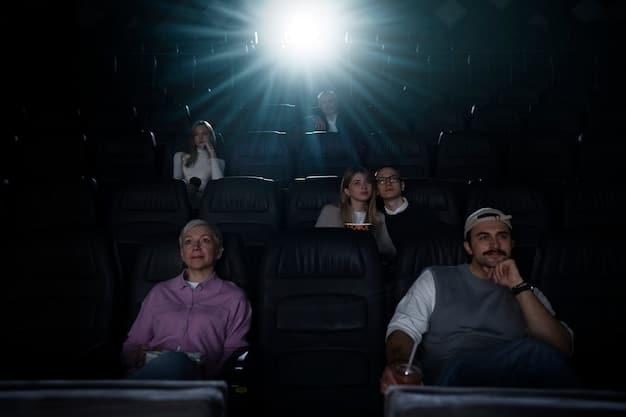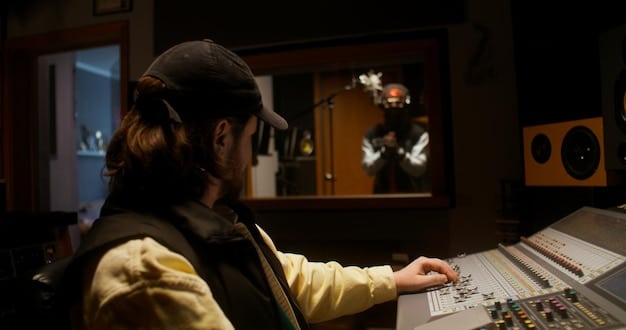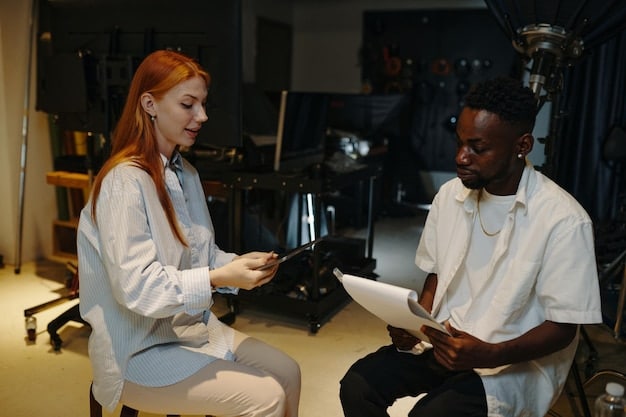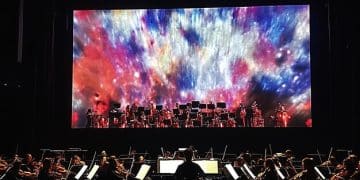The Role of Music in Short Films: Choosing the Perfect Score

The Role of Music in Short Films: How to Choose the Right Score to Enhance Your Story involves understanding how music amplifies emotions, enhances narrative, and creates a memorable viewing experience, making music selection a crucial element in filmmaking.
Music is a powerful storytelling tool. In the realm of short films, where every second counts, the role of music in short films: how to choose the right score to enhance your story becomes even more crucial. It’s not just about adding background noise; it’s about amplifying emotions and elevating the narrative.
Choosing the right score can transform a good short film into a masterpiece. How exactly can filmmakers make informed decisions about this critical aspect of their projects?
Understanding the Power of Music in Short Films
Music in film is more than just background ambience. It’s a potent tool that can shape the audience’s experience, adding depth, nuance, and emotional resonance. Essentially, it’s about understanding the role of music in short films: how to choose the right score to enhance your story from pre-production itself.
Emotional Amplification
Music can evoke a wide range of emotions, from joy and excitement to sadness and suspense. By carefully selecting the right musical cues, filmmakers can manipulate audience feelings and create a more immersive and engaging experience.
Narrative Enhancement
A well-chosen score can also enhance the narrative of a short film. It can foreshadow events, reveal character traits, and provide commentary on the themes being explored. The music adds layers of meaning to the story.
- Setting the Tone: Music immediately establishes the mood and atmosphere of a scene.
- Guiding the Viewer: It directs attention to key moments and themes.
- Creating Rhythm: Music can dictate the pace and energy of the film.
Ultimately, music in a short film serves as a silent narrator, guiding the audience through the emotional and thematic landscape of the story. Choosing appropriately is paramount to fully realize the role of music in short films: how to choose the right score to enhance your story.
Key Considerations When Selecting a Score
Choosing the right music for your short film is a multifaceted process, one that requires a deep understanding of your film’s themes, characters, and overall tone. Here’s how to consider the role of music in short films: how to choose the right score to enhance your story to align with your vision:
Understanding Your Film’s Theme
Before diving into the world of scores, consider what your film is fundamentally about. Is it a story of loss, love, triumph, or something else? The music should reflect and amplify this central theme.
Character Development
Music can provide insight into your characters’ inner lives. Consider creating musical motifs or themes for each character that evolve as they develop throughout the film. Using score to enhance character depth is a great way to underscore the role of music in short films: how to choose the right score to enhance your story.

- Instrument Choice: Different instruments evoke different emotions, reflecting character traits.
- Tempo and Rhythm: The pacing of the music can mirror character’s internal state.
- Melodic Themes: Recurring musical themes can signal character transformations.
In sum, careful consideration of these factors will guide you to make soundtrack choices that truly match your narrative. By carefully choosing your score, you can elevate your film’s impact, showing the true importance of the role of music in short films: how to choose the right score to enhance your story.
Finding the Right Composer
Collaborating with the right composer is crucial to elevate your short film’s soundtrack. A composer is a key collaborator in realizing the role of music in short films: how to choose the right score to enhance your story. Here’s how to find and work with the ideal musical partner:
Where to Look
Start your search by exploring online platforms dedicated to connecting filmmakers with composers. Also, consider reaching out to music schools or conservatories.
Assessing Their Portfolio
Review potential composers’ previous works, paying close attention to their ability to adapt to different genres and styles. A diverse portfolio is often a sign of versatility and creativity.
When you’re assessing their work, here are a few important factors to keep in mind:
- Genre Versatility: Look for composers who can work across different genres.
- Emotional Range: Notice if they can evoke a variety of emotions through their music.
- Technical Proficiency: Ensure they have a strong understanding of music production.
Finding a composer who truly understands and enhances the role of music in short films: how to choose the right score to enhance your story is key. By partnering with a talented composer, you can transform your film into an unforgettable sensory experience.
Budgeting for Music
One of the most immediate considerations for a short film is the budget. Let’s discuss budgeting and how it relates to fulfilling the role of music in short films: how to choose the right score to enhance your story.
Understanding Costs
Before approaching composers, research the typical costs associated with hiring a composer. Factors such as the length of the film, the complexity of the score, and the composer’s experience level can all impact the price.
Negotiating Fair Rates
Be transparent about your budget limitations and be prepared to negotiate rates that are fair for both you and the composer. Consider offering a percentage of future profits or other incentives to make the project more attractive.

Working within a realistic budget will allow you to make good art and continue to provide opportunities for others in the future.
The Importance of Sound Design
In addition to the musical score, sound design plays a vital role in enhancing the overall viewing experience of a short film. It is extremely important to include sound design considerations when thinking about the role of music in short films: how to choose the right score to enhance your story.
Creating Atmosphere
Sound design involves creating a rich tapestry of ambient sounds, sound effects, and foley work that can immerse the audience in the world of the film. Whether it’s the rustling of leaves in a forest or the bustling sounds of a city street, sound design can transport viewers and make them feel as if they are right there in the scene.
Enhancing Realism
Realistic sound effects can also enhance the overall believability of a short film. By carefully recording and incorporating sounds that mimic real-world environments, filmmakers can create a more convincing and immersive experience for the audience.
- Foley Artistry: Creating real-time sound effects to match on-screen actions.
- Ambient Recordings: Capturing subtle environmental sounds to enhance atmosphere.
- Sound Mixing: Blending music, dialogue, and sound effects for a cohesive audio experience.
Sound design is also a fundamental facet of enhancing the role of music in short films: how to choose the right score to enhance your story. With attention to sound in post-production, even a simple scene can become unforgettable.
Licensing and Legal Considerations
Navigating the legal landscape of music licensing is another essential aspect of filmmaking. It’s crucial to ensure that when thinking about the role of music in short films: how to choose the right score to enhance your story you think about how to protect yourself legally.
Understanding Copyright Laws
Familiarize yourself with copyright laws and regulations related to music usage in film. Using copyrighted music without proper authorization can result in legal consequences and financial penalties.
Obtaining Proper Licenses
If you plan to use pre-existing music in your short film, obtain the necessary licenses from the copyright holders. This may involve securing synchronization licenses, master use licenses, and performance licenses.
When managing the musical and legal concerns of your film, be mindful of:
- Synchronization Rights: Permissions to use a song in a visual medium.
- Master Use Rights: Permissions to use a specific recording of a song.
- Public Performance Rights: Permissions for public exhibition of the film with the music.
By ensuring compliance with copyright laws and obtaining the necessary licenses, you can protect yourself legally and ensure that your short film can be enjoyed by audiences around the world – solidifying the role of music in short films: how to choose the right score to enhance your story.
| Key Point | Brief Description |
|---|---|
| 🎵 Emotional Impact | Music amplifies emotions, enhancing audience connection with the story. |
| 🎬 Narrative Enhancement | A well-chosen score can add depth and context to narrative elements. |
| 🤝 Composer Collaboration | Partnering with the right composer is crucial for realizing your vision. |
| 💰 Budget Considerations | Understanding costs and negotiating fair rates is essential for project success. |
Frequently Asked Questions
Music provides emotional depth, elevates narrative tension, and enhances audience engagement, transforming an ordinary film into an unforgettable cinematic experience. It’s critical for captivating viewers.
Start by exploring online platforms and music schools, reviewing portfolios, and looking for someone who understands your film’s vision. Communication and shared vision are key components of strong collaboration.
Research average composer fees, consider the music’s complexity, and be transparent about your budget constraints. Negotiations and alternative compensation methods, such as profit percentages, can be helpful measures.
Sound design enriches films with ambient sounds and effects, creating atmosphere and realism. The impact on the audience is significant, as effective sound design can make a movie more convincing and immersive.
Understand copyright laws, secure necessary licenses (synchronization, master use, public performance), and ensure legal compliance. Using unlicensed music could result in severe legal and financial repercussions.
Conclusion
Ultimately, the role of music in short films: how to choose the right score to enhance your story is an art that requires careful planning, collaboration, and consideration. By prioritizing music and sound from the start, filmmakers can create short films that resonate deeply with audiences.
Hopefully, you can carry forward these principles in your next project.





